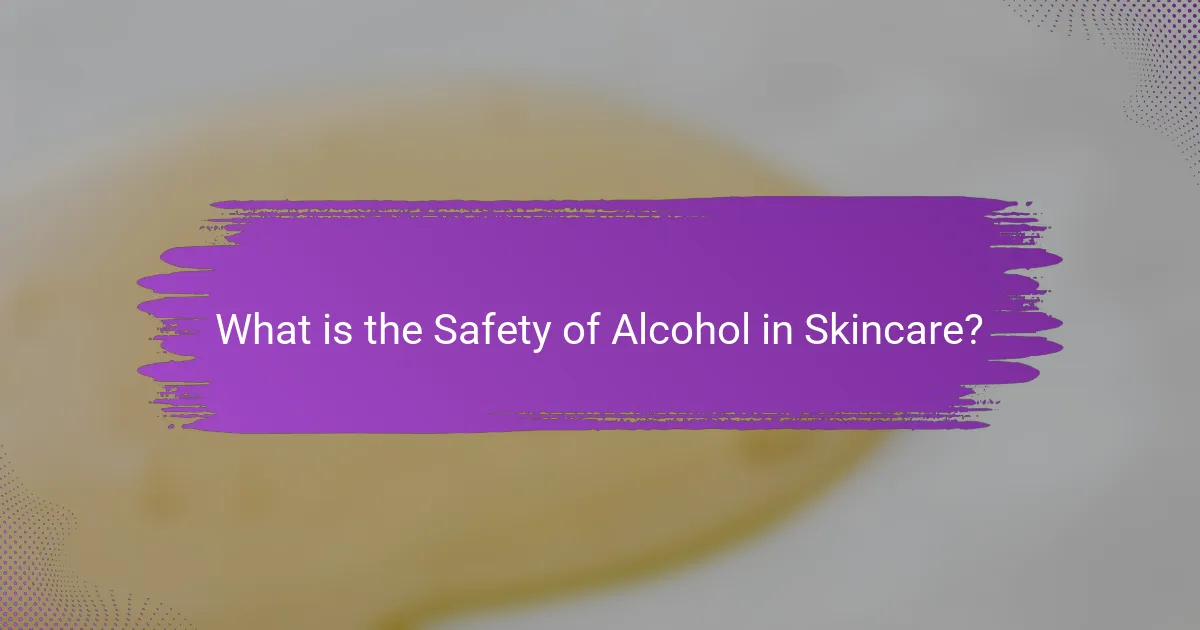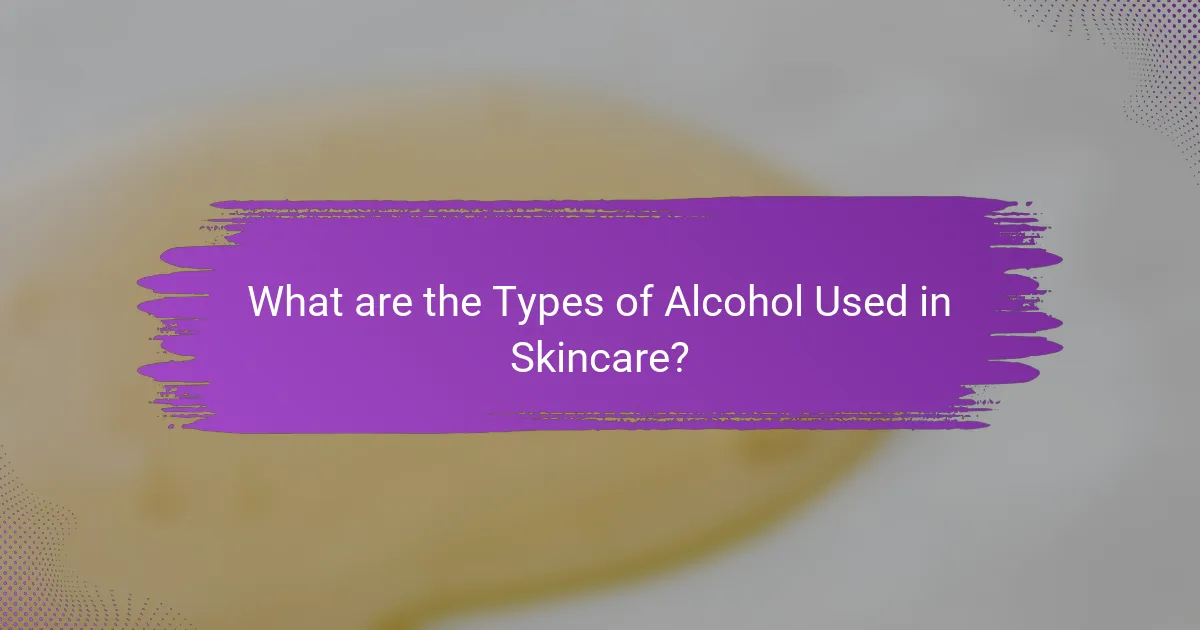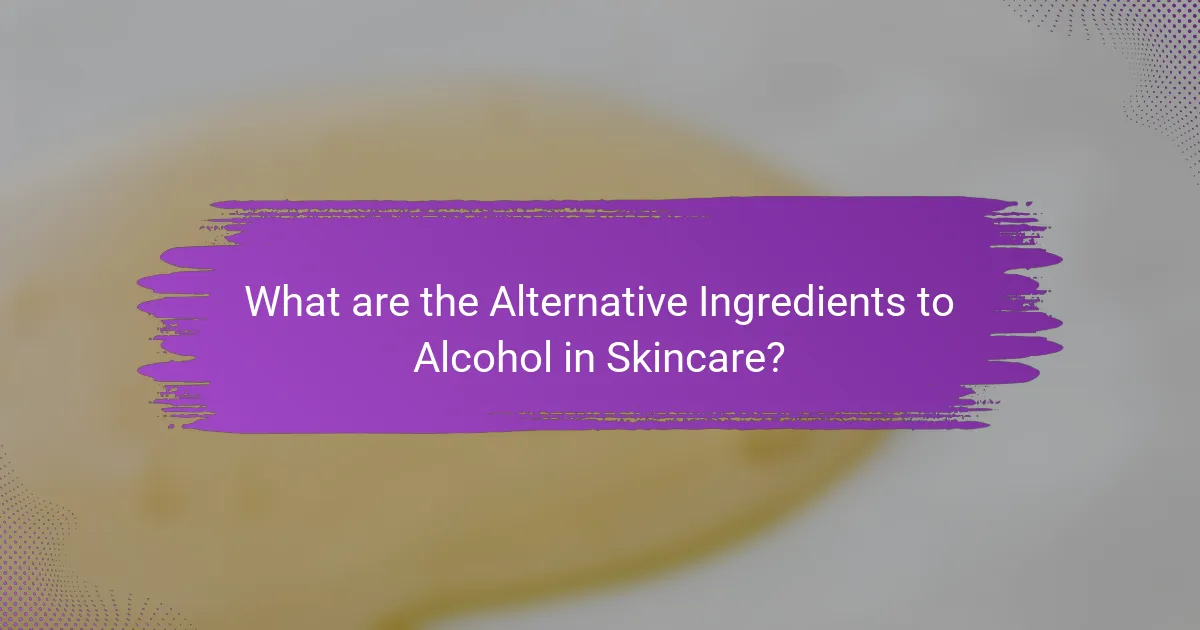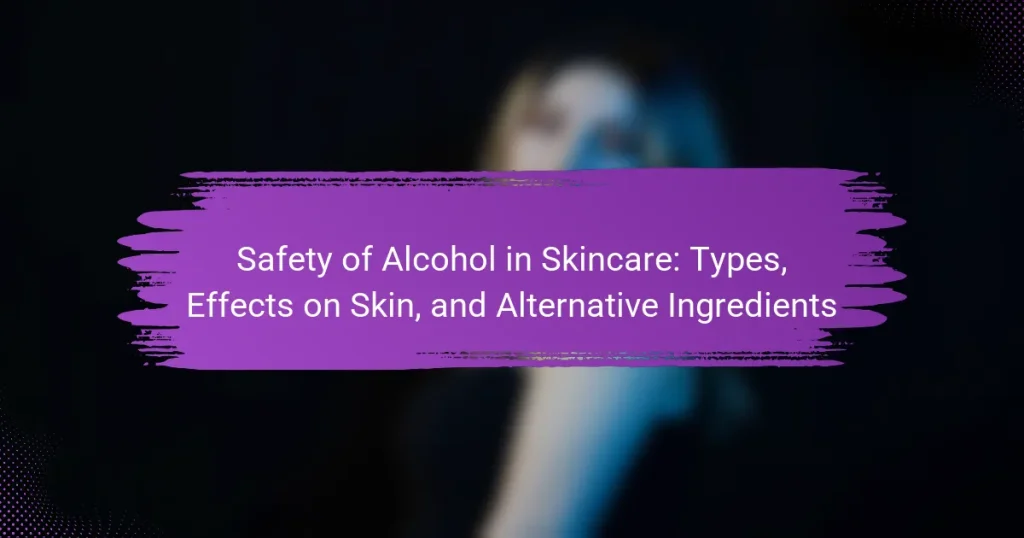The article focuses on the safety of alcohol in skincare, examining two primary categories: simple alcohols and fatty alcohols. Simple alcohols, such as ethanol and isopropyl alcohol, can be drying and irritating, potentially disrupting the skin barrier, while fatty alcohols like cetyl and stearyl alcohol serve as emollients that moisturize and soothe the skin. It also discusses various types of alcohol used in formulations, including denatured alcohol and benzyl alcohol, highlighting their roles and effects. Additionally, the article explores alternative ingredients like glycerin, witch hazel, and aloe vera, which offer hydration and skin benefits without the drawbacks associated with alcohol. Understanding these elements is essential for evaluating the effectiveness and safety of skincare products.

What is the Safety of Alcohol in Skincare?
Alcohol in skincare can be safe or harmful, depending on the type used. There are two main categories of alcohol: simple alcohols and fatty alcohols. Simple alcohols, like ethanol and isopropyl alcohol, can be drying and irritating to the skin. They may disrupt the skin barrier, especially in high concentrations. In contrast, fatty alcohols, such as cetyl and stearyl alcohol, are emollients that can moisturize and soothe the skin. Studies indicate that fatty alcohols are generally safe for most skin types. Therefore, understanding the type of alcohol in a product is crucial for assessing its safety in skincare.
Why is alcohol used in skincare products?
Alcohol is used in skincare products primarily as a solvent and preservative. It helps dissolve other ingredients, allowing for better absorption into the skin. Alcohol also acts as an antimicrobial agent, preventing the growth of harmful bacteria in formulations. Additionally, it can enhance the texture of products, making them feel lighter and more refreshing on the skin. Some alcohols, like fatty alcohols, provide moisturizing benefits. Research shows that certain types of alcohol can improve product stability and extend shelf life. However, not all alcohols are the same; denatured alcohol and isopropyl alcohol may cause dryness or irritation for some skin types.
What types of alcohol are commonly found in skincare?
Common types of alcohol found in skincare include ethanol, isopropyl alcohol, and fatty alcohols. Ethanol is often used as a solvent and preservative. Isopropyl alcohol serves as an antiseptic and astringent. Fatty alcohols, such as cetyl, stearyl, and cetearyl alcohol, function as emollients and emulsifiers. These alcohols help improve the texture and absorption of products. Ethanol and isopropyl alcohol can be drying to the skin in high concentrations. However, fatty alcohols are generally considered moisturizing. Their presence in formulations is based on their functional benefits for skin care.
How does alcohol function in skincare formulations?
Alcohol functions in skincare formulations primarily as a solvent and preservative. It helps dissolve other ingredients, allowing for better product consistency. Alcohol also aids in the quick absorption of active compounds into the skin. Additionally, it can have antibacterial properties, which help inhibit microbial growth in products. Certain types of alcohol, like denatured alcohol, can provide a cooling sensation upon application. However, it may also lead to skin dryness if used excessively. Studies indicate that products with high alcohol content can disrupt the skin barrier, leading to irritation. Thus, the concentration and type of alcohol are crucial in determining its effects on the skin.
What are the potential effects of alcohol on the skin?
Alcohol can have several potential effects on the skin. It may cause dryness by stripping away natural oils. This can lead to irritation and flakiness. Alcohol can also compromise the skin barrier function. A weakened barrier can result in increased sensitivity. Additionally, alcohol may exacerbate conditions like acne and rosacea. Some studies indicate that high concentrations of alcohol in products can cause inflammation. It is essential to consider these effects when using alcohol-based skincare products.
How can alcohol impact skin hydration levels?
Alcohol can significantly reduce skin hydration levels. It acts as a solvent that can strip natural oils from the skin. This leads to dryness and irritation. Alcohol can disrupt the skin barrier function. A compromised barrier allows moisture to escape more easily. Studies show that products with high alcohol content can exacerbate dryness. For instance, a study published in the Journal of Investigative Dermatology found that alcohol can impair skin hydration. Regular use of alcohol-based products may result in long-term moisture loss.
What are the differences between drying and fatty alcohols?
Drying alcohols and fatty alcohols differ significantly in their properties and effects on the skin. Drying alcohols, such as ethanol and isopropyl alcohol, evaporate quickly and can strip moisture from the skin. This can lead to dryness and irritation, making them unsuitable for sensitive skin types. Fatty alcohols, like cetyl alcohol and stearyl alcohol, are derived from fats and oils. They provide emollient properties and help to moisturize and soften the skin. Fatty alcohols are generally considered safe and beneficial in skincare formulations. Their ability to condition the skin contrasts sharply with the drying effects of drying alcohols.
What are the concerns regarding alcohol in skincare?
Concerns regarding alcohol in skincare include skin irritation and dryness. Alcohol can strip the skin of its natural oils. This leads to a compromised skin barrier. Sensitive skin types may experience redness or inflammation. Some alcohols, like denatured alcohol, are more irritating than others. Prolonged use can worsen skin conditions like eczema or rosacea. Formulations with high alcohol content may cause adverse reactions. Studies indicate that alcohol can disrupt the skin’s microbiome.
How does alcohol affect sensitive skin types?
Alcohol can negatively affect sensitive skin types by causing irritation and dryness. Sensitive skin often has a compromised barrier function. When alcohol is applied, it can strip natural oils, leading to moisture loss. This can exacerbate redness and inflammation. Studies show that alcohol-based products can trigger allergic reactions in sensitive individuals. Ingredients like ethanol and isopropyl alcohol are particularly harsh. Therefore, those with sensitive skin should avoid alcohol in their skincare products.
What are the long-term effects of using alcohol-based products?
Long-term use of alcohol-based products can lead to skin dryness and irritation. Alcohol can strip the skin of its natural oils. This can result in a compromised skin barrier. A compromised barrier increases susceptibility to environmental damage. Prolonged exposure may also cause inflammation or allergic reactions. Research indicates that frequent use can exacerbate conditions like eczema and psoriasis. Additionally, alcohol-based products may disrupt the skin’s microbiome. This disruption can lead to an imbalance of beneficial bacteria on the skin.
How can consumers make informed choices regarding alcohol in skincare?
Consumers can make informed choices regarding alcohol in skincare by understanding the types of alcohol used in products. There are two main categories: fatty alcohols and simple alcohols. Fatty alcohols, like cetyl and stearyl alcohol, are moisturizing and beneficial for skin. Simple alcohols, such as ethanol and isopropyl alcohol, can be drying and irritating.
To assess products, consumers should read ingredient labels carefully. Look for specific alcohol types listed. Research the effects of these ingredients on skin health. Studies indicate that simple alcohols can disrupt the skin barrier. This can lead to increased dryness and irritation.
Consumers should also consider their skin type. Those with sensitive or dry skin may want to avoid products with high concentrations of simple alcohols. Instead, they can opt for formulations that include fatty alcohols for hydration.
Additionally, seeking products with alternative ingredients can be beneficial. Ingredients like glycerin and hyaluronic acid provide moisture without the negative effects of simple alcohols. By educating themselves on these factors, consumers can choose skincare products that align with their skin health needs.
What should consumers look for on ingredient labels?
Consumers should look for specific information on ingredient labels to ensure product safety and suitability. Key aspects include the type of alcohol listed. Some alcohols can be drying or irritating, while others may be beneficial. Consumers should also check for potential allergens, which can cause skin reactions. Additionally, it’s important to identify the order of ingredients. Ingredients are listed by quantity, with the highest amounts appearing first. Consumers should look for natural ingredients over synthetic ones when possible. Lastly, they should be aware of any preservatives or additives that may affect skin health. Understanding these factors can help consumers make informed choices about skincare products.

What are the Types of Alcohol Used in Skincare?
There are several types of alcohol used in skincare. These include fatty alcohols, denatured alcohol, and benzyl alcohol. Fatty alcohols, such as cetyl and stearyl alcohol, serve as emollients and thickeners. They help to moisturize and soften the skin. Denatured alcohol, often labeled as alcohol denat, acts as a solvent and can provide a quick-drying effect. However, it may also be drying to the skin. Benzyl alcohol is commonly used as a preservative and has antimicrobial properties. It is important to understand the role of each type of alcohol in formulations. Choosing the right type can influence the overall effectiveness and safety of skincare products.
What are the common types of alcohol in skincare products?
Common types of alcohol in skincare products include ethanol, isopropyl alcohol, and fatty alcohols. Ethanol serves as a solvent and astringent, often found in toners. Isopropyl alcohol acts as a disinfectant and helps with product [censured]. Fatty alcohols, such as cetyl and stearyl alcohol, provide emollient properties and help to moisturize the skin. These alcohols are commonly used due to their functional benefits in formulations.
What are the characteristics of denatured alcohol?
Denatured alcohol is ethanol that has been modified to prevent human consumption. It typically contains additives that render it unpalatable or toxic. Common additives include methanol, isopropyl alcohol, or other chemicals. Denatured alcohol is often used as a solvent in industrial applications. It evaporates quickly, making it useful for cleaning and disinfecting. This alcohol is flammable and should be handled with care. It can cause skin irritation for some individuals. Its use in skincare products is controversial due to potential skin-drying effects.
How do fatty alcohols differ from other types?
Fatty alcohols differ from other types of alcohols in their chemical structure and properties. They are long-chain fatty acids that have been reduced to form alcohols. This structure gives fatty alcohols emollient properties, making them effective moisturizers in skincare. In contrast, short-chain alcohols, like ethanol, can be drying and irritating to the skin. Fatty alcohols, such as cetyl alcohol and stearyl alcohol, are non-irritating and safe for use in cosmetic formulations. Their ability to condition the skin sets them apart from other alcohol types, which may not provide similar benefits.
What are the benefits and drawbacks of each type of alcohol?
The benefits and drawbacks of each type of alcohol vary significantly. Ethanol, commonly found in beverages, can act as a disinfectant and solvent in skincare. However, it may also cause skin dryness and irritation. Isopropyl alcohol is effective for sanitizing and has antibacterial properties. Its drawback is potential skin irritation and dehydration. Benzyl alcohol is a preservative that can prevent microbial growth. However, it can also lead to allergic reactions in sensitive individuals. Fatty alcohols, such as cetyl and stearyl alcohol, provide moisturizing benefits and help stabilize formulations. Their downside is that they may clog pores for some skin types. Each type of alcohol presents unique benefits and drawbacks that should be considered in skincare applications.
In what scenarios are drying alcohols beneficial?
Drying alcohols are beneficial in scenarios requiring quick evaporation and skin cleansing. They are often used in products designed for oily or acne-prone skin. These alcohols help to remove excess oil and impurities effectively. They also serve as preservatives, extending the shelf life of cosmetic products. Additionally, drying alcohols can enhance the [censured] of active ingredients into the skin. Their rapid evaporation can leave a non-greasy finish, making them suitable for formulations aimed at mattifying the skin. However, their use should be balanced to avoid skin irritation, especially in sensitive skin types.
How do fatty alcohols contribute to skin health?
Fatty alcohols contribute to skin health by acting as emollients and moisturizers. They help to soften the skin and improve its hydration levels. Fatty alcohols, such as cetyl alcohol and stearyl alcohol, create a barrier on the skin’s surface. This barrier prevents moisture loss and protects against environmental irritants. Additionally, they enhance the texture of skincare products, making them feel smoother on application. Research indicates that fatty alcohols can also have anti-inflammatory properties. This can help soothe irritated skin and reduce redness. Their ability to stabilize formulations further supports the effectiveness of active ingredients in skincare products.

What are the Alternative Ingredients to Alcohol in Skincare?
Alternative ingredients to alcohol in skincare include glycerin, witch hazel, and aloe vera. Glycerin acts as a humectant, attracting moisture to the skin. Witch hazel provides astringent properties without the drying effects of alcohol. Aloe vera is known for its soothing and hydrating qualities. These ingredients help maintain skin hydration and integrity. Studies show that glycerin can improve skin barrier function. Witch hazel is often used in formulations for sensitive skin. Aloe vera is recognized for its anti-inflammatory benefits. These alternatives ensure effective skincare without the potential drawbacks of alcohol.
What are some effective alternatives to alcohol in skincare formulations?
Effective alternatives to alcohol in skincare formulations include witch hazel, glycerin, and aloe vera. Witch hazel acts as a natural astringent and has anti-inflammatory properties. Glycerin is a humectant that hydrates the skin and improves moisture retention. Aloe vera soothes and hydrates while providing anti-inflammatory benefits. These alternatives help maintain skin hydration without the drying effects of alcohol. Studies show that glycerin can improve skin barrier function and hydration levels. Witch hazel has been used traditionally for its soothing properties, confirming its efficacy in skincare.
How do natural oils serve as substitutes for alcohol?
Natural oils serve as substitutes for alcohol by providing similar benefits without the drying effects. They can act as moisturizers, enhancing skin hydration. Natural oils, such as jojoba and argan oil, mimic the skin’s natural oils. This helps maintain the skin’s barrier function. Unlike alcohol, which can strip moisture, natural oils nourish the skin. Studies show that oils can reduce irritation and inflammation. For instance, coconut oil has antimicrobial properties, making it a beneficial alternative. Overall, natural oils offer a gentler approach to skincare.
What role do humectants play in alcohol-free skincare?
Humectants play a crucial role in alcohol-free skincare by attracting and retaining moisture in the skin. They help maintain skin hydration levels, which is essential for a healthy complexion. Common humectants include glycerin and hyaluronic acid. These ingredients draw water from the environment and deeper skin layers. This moisture retention can enhance skin elasticity and reduce dryness. Studies show that products containing humectants improve skin barrier function. This results in smoother, more supple skin. In alcohol-free formulations, humectants compensate for the lack of drying agents, ensuring effective hydration.
How can consumers identify alcohol-free products?
Consumers can identify alcohol-free products by checking the ingredient list on the packaging. Alcohol-free products typically do not contain ethanol or any alcohol derivatives. Look for labels that explicitly state “alcohol-free.” Products may also highlight this claim on the front label. Additionally, consumers can research brands known for alcohol-free formulations. Ingredients such as glycerin or aloe vera are often used instead of alcohol. The absence of alcohol can benefit those with sensitive skin. According to a study published in the Journal of Cosmetic Dermatology, alcohol-free products can reduce skin irritation.
What certifications or labels indicate alcohol-free formulations?
Certifications and labels that indicate alcohol-free formulations include the “Alcohol-Free” label, which is commonly used in the cosmetics industry. This label signifies that the product does not contain any ethyl alcohol or denatured alcohol. Another certification is the “USDA Organic” label, which often implies that products are free from synthetic alcohols. The “Non-Alcoholic” certification is also recognized, particularly for beverages but is sometimes applied to skincare. Brands may also use specific phrases like “No Alcohol” or “Alcohol-Free” on their packaging to communicate this attribute clearly. These labels help consumers identify products that align with their preferences for alcohol-free formulations.
What are the best practices for incorporating alcohol-free skincare into a routine?
Use alcohol-free products to avoid skin irritation. Start by selecting a gentle cleanser without alcohol. Follow with an alcohol-free toner to balance skin pH. Incorporate alcohol-free serums that hydrate and nourish the skin. Apply alcohol-free moisturizers to maintain hydration levels. Use sunscreen that is alcohol-free to protect against UV damage. Gradually introduce products to monitor skin reactions. Always patch test new products to ensure compatibility with your skin type.
The main entity of this article is the safety of alcohol in skincare. The article explores the different types of alcohol used in skincare products, including simple alcohols and fatty alcohols, and their varying effects on skin health. It discusses the potential benefits and drawbacks of these alcohols, particularly their impact on skin hydration and barrier function. Additionally, the article highlights alternative ingredients to alcohol, such as glycerin and aloe vera, which can provide effective skincare solutions without the associated risks of drying or irritation. Readers will gain insights into making informed choices regarding alcohol in their skincare routines.


